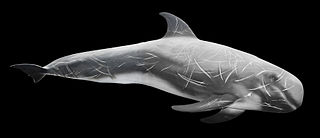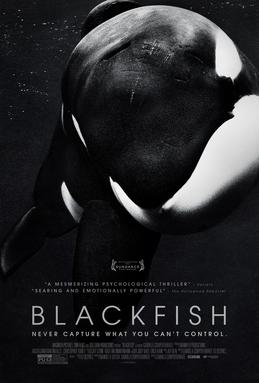See also
- Blackfishing, white social media influencers who are perceived to be appropriating the look of Black women
Blackfish is a common name for several species of fish.
Blackfish may also refer to:

Cetacea is an infraorder of aquatic mammals belonging to the order Artiodactyla that includes whales, dolphins and porpoises. Key characteristics are their fully aquatic lifestyle, streamlined body shape, often large size and exclusively carnivorous diet. They propel themselves through the water with powerful up-and-down movement of their tail which ends in a paddle-like fluke, using their flipper-shaped forelimbs to maneuver.

Whales are a widely distributed and diverse group of fully aquatic placental marine mammals. As an informal and colloquial grouping, they correspond to large members of the infraorder Cetacea, i.e. all cetaceans apart from dolphins and porpoises. Dolphins and porpoises may be considered whales from a formal, cladistic perspective. Whales, dolphins and porpoises belong to the order Cetartiodactyla, which consists of even-toed ungulates. Their closest non-cetacean living relatives are the hippopotamuses, from which they and other cetaceans diverged about 54 million years ago. The two parvorders of whales, baleen whales (Mysticeti) and toothed whales (Odontoceti), are thought to have had their last common ancestor around 34 million years ago. Mysticetes include four extant (living) families: Balaenopteridae, Balaenidae, Cetotheriidae, and Eschrichtiidae. Odontocetes include the Monodontidae, Physeteridae, Kogiidae, and Ziphiidae, as well as the six families of dolphins and porpoises which are not considered whales in the informal sense.
Blackfish is a common name for various species of fishes and cetaceans, including:

Risso's dolphin is a dolphin, the only species of the genus Grampus. Some of the closest related species to these dolphins include: pilot whales, pygmy killer whales, melon-headed whales, and false killer whales.

Oceanic dolphins or Delphinidae are a widely distributed family of dolphins that live in the sea. Close to forty extant species are recognised. They include several big species whose common names contain "whale" rather than "dolphin", such as the Globicephalinae. Delphinidae is a family within the superfamily Delphinoidea, which also includes the porpoises (Phocoenidae) and the Monodontidae. River dolphins are relatives of the Delphinoidea.

The toothed whales are a clade of cetaceans that includes dolphins, porpoises, and all other whales with teeth, such as beaked whales and the sperm whales. 73 species of toothed whales are described. They are one of two living groups of cetaceans, the other being the baleen whales (Mysticeti), which have baleen instead of teeth. The two groups are thought to have diverged around 34 million years ago (mya).

Pilot whales are cetaceans belonging to the genus Globicephala. The two extant species are the long-finned pilot whale and the short-finned pilot whale. The two are not readily distinguishable at sea, and analysis of the skulls is the best way to distinguish between the species. Between the two species, they range nearly worldwide, with long-finned pilot whales living in colder waters and short-finned pilot whales living in tropical and subtropical waters. Pilot whales are among the largest of the oceanic dolphins, exceeded in size only by the orca. They and other large members of the dolphin family are also known as blackfish.

The rough-toothed dolphin is a species of dolphin that can be found in deep warm and tropical waters around the world.

The false killer whale is a species of oceanic dolphin that is the only extant representative of the genus Pseudorca. It is found in oceans worldwide but mainly in tropical regions. It was first described in 1846 as a species of porpoise based on a skull, which was revised when the first carcasses were observed in 1861. The name "false killer whale" comes from having a skull similar to the orca, or killer whale.

The melon-headed whale, also known less commonly as the electra dolphin, little killer whale, or many-toothed blackfish, is a toothed whale of the oceanic dolphin family (Delphinidae). The common name is derived from the head shape. Melon-headed whales are widely distributed throughout deep tropical and subtropical waters worldwide, but they are rarely encountered at sea. They are found near shore mostly around oceanic islands, such as Hawaii, French Polynesia, and the Philippines.

Otodus megalodon, commonly known as megalodon, is an extinct species of giant mackerel shark that lived approximately 23 to 3.6 million years ago (Mya), from the Early Miocene to the Pliocene epochs. O. megalodon was formerly thought to be a member of the family Lamnidae and a close relative of the great white shark, but has been reclassified into the extinct family Otodontidae, which diverged from the great white shark during the Early Cretaceous.

Tilikum, nicknamed Tilly, was a captive male orca who spent most of his life at SeaWorld Orlando in Florida. He was captured in Iceland in 1983; about a year later, he was transferred to Sealand of the Pacific near Victoria, British Columbia, Canada. He was subsequently transferred in 1992 to SeaWorld in Orlando, Florida, where he sired 21 calves throughout his life.

Livyatan is an extinct genus of macroraptorial sperm whale containing one known species: L. melvillei. The genus name was inspired by the biblical sea monster Leviathan, and the species name by Herman Melville, the author of the famous novel Moby-Dick about a white bull sperm whale. Herman Melville often referred to whales as "Leviathans" in his book. It is mainly known from the Pisco Formation of Peru during the Tortonian stage of the Miocene epoch, about 9.9–8.9 million years ago (mya); however, finds of isolated teeth from other locations such as Chile, Argentina, the United States (California), South Africa and Australia imply that either it or a close relative survived into the Pliocene, around 5 mya, and may have had a global presence. It was a member of a group of macroraptorial sperm whales and was probably an apex predator, preying on whales, seals and so forth. Characteristically of raptorial sperm whales, Livyatan had functional, enamel-coated teeth on the upper and lower jaws, as well as several features suitable for hunting large prey.

Orcinus citoniensis is an extinct species of orca identified in the Late Pliocene of Italy and the Early Pleistocene of England. It was smaller than the modern killer whale, 4 m (13 ft) versus 7 to 10 m, and had around 8 more teeth in its jaw. It may have resembled the modern killer whale in appearance, and could represent a transitional species between the modern killer whale and other dolphins. O. citoniensis could have hunted fish and squid in pods, and coexisted with other large predators of the time such as the orcinine Hemisyntrachelus and the extinct shark Otodus megalodon.

Blackfish is a 2013 American documentary film directed by Gabriela Cowperthwaite. It concerns Tilikum, an orca held by SeaWorld and the controversy over captive orcas. The film premiered at the 2013 Sundance Film Festival on January 19, 2013, and was picked up by Magnolia Pictures and CNN Films for wider release. It was nominated for the BAFTA Award for Best Documentary.

FishAct is an international marine conservation and activism organisation based in Amsterdam, Netherlands. Its name was changed in 2018 to FishAct. FishAct's stated mission is to "end the industrial overfishing of the oceans" and to "empower individuals to get actively involved in building grassroots citizen-led conservation communities". The non-governmental organisation was founded in 2010 and has active local chapters in Germany and the United Kingdom. To achieve its goals, the organisation uses a combination of investigation, education, and non-violent direct-action. Campaigns have included gathering support for the release of captive cetaceans, actions against dolphin drive hunts and campaigning to end overfishing of the endangered bluefin tuna in the Mediterranean Sea.
Deraniyagala's beaked whale is a species of mesoplodont whale closely related to the ginkgo-toothed beaked whale.

Girella elevata, the rock blackfish, Eastern rock blackfish, black rockfish or Eastern rock blackfish drummer is a species of marine ray-finned fish, a sea chub from the family Kyphosidae. It is found in the southwestern Pacific Ocean around eastern Australia and northern New Zealand.